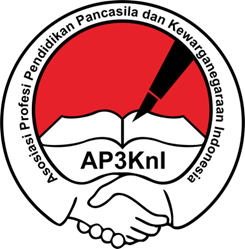The Effect of the Reflective Pedagogy Paradigm Approach in Improving the Disciplinary Attitudes of Third Grade Students of SD Inpres Bontoala I Gowa Regency
DOI: https://doi.org/10.26618/jed.v8i1.10234
Paradigm, Pedagogy, Reflective, Discipline
Abstract
In terms of obeying the rules, students in uniform, whether according to the regulations, clothes are inserted, and wear a belt and black shoes. The researcher also observed students' self-control and whether students listened when the teacher explained. Another thing that was observed was students' awareness when learning, whether they worked seriously to get good grades. Interviews conducted by researchers with class teachers related to student discipline in participating in learning at school. The type of research used is quantitative research. This means that this research aims to find data through experiments. The experiment format chosen in this research is a pre-experimental design. It is said to be a pre-experimental design because the design is not a real experiment because external variables will still affect the formation of the dependent variable. The subject and research sample are class III students totaling 33 people. Data collection techniques include initial tests, treatment, and final tests. The data used in this study are descriptive statistical analysis and inferential statistical data analysis. From the results of the calculation on the pretest, the average value of the discipline level of the students of SD Inpres Bontoala I, Pallangga District, Gowa Regency, after using the Reflective Pedagogy Paradigm Approach is 60.45. And from the posttest calculation, the average value of the discipline level of SD Inpres Bontoala I students in Pallangga District, Gowa Regency, after using the Reflective Pedagogy Paradigm Approach is 84.54.References
Ahsanulkhaq, M. (2019). Membentuk Karakter Religius Peserta Didik Melalui Metode Pembiasaan. Jurnal Prakarsa Paedagogia, 2(1), 21–33.
Arianto, D. A. N. (2013). Pengaruh Kedisiplinan, Lingkungan Kerja dan Budaya Kerja Terhadap Kinerja Tenaga Pengajar. Jurnal Economia, 9(2), 191–200.
Elly, R. (2016). Hubungan Kedisiplinan Terhadap Hasil Belajar Siswa Kelas V Di Sd Negeri 10 Banda Aceh. Pesona Dasar (Jurnal Pendidikan Dasar Dan Humaniora), 3(4), 43–53.
Galeh Iswari, I., & Akip, M. (2015). Peningkatan Kompetensi Pada Pembelajaran Tematik Di Kelas III Menggunakan Model Berbasis Paradigma Pedagogi Reflektif Di Sekolah Dasar. Jurnal Pendidikan Dasar, 3(1), 38–47.
Hartana, A., Punajii, S., & Dedi, K. (2016). Penerapan strategi pembelajaran paradigma pedagogi Igantian (REflektif) terhadap peningkatan hasil belajar dan motivasi berprestasi belajar Ilmu Pengetahuan Alam (IPA) siswa kelas V Sekolah Dasar. Jurnal Pendidikan: Teori, Penelitian Dan Pengembangan, 1(4), 765–779.
Hasudungan, A. N., & Riau, P. (2022). Paradigma Pedagogi Reflektif (Ppr): Konstruksi Nilai-Nilai Karakter Dalam Materi Sejarah Maritim Untuk Sekolah Menengah Atas. Education & Learning, 2(2), 64–73.
Kamarudin, K. (2021). Meningkatkan Hasil Belajar Siswa Pada Pelajaran PPKn Dengan Menerapkan Model Paradigma Pedagogi Reflektif di Sekolah Dasar. Edukatif : Jurnal Ilmu Pendidikan, 3(5), 3371–3375. https://edukatif.org/index.php/edukatif/article/view/918
Lumban Gaol, N. W. (2021). Pengaruh Kompetensi Pedagogik Guru Pendidikan Agama Kristen terhadap Kedisiplinan Siswa T.A 2020/2021 (Studi Kasus Di Kelas X SMK Swasta Arina Sidikalang). Repository UHN, 1–61. http://www.ncbi.nlm.nih.gov/pubmed/810049%0Ahttp://doi.wiley.com/10.1002/anie.197505391%0Ahttp://www.sciencedirect.com/science/article/pii/B9780857090409500205%0Ahttp://www.ncbi.nlm.nih.gov/pubmed/21918515%0Ahttp://www.cabi.org/cabebooks/ebook/20083217094
Noor, T. (2018). Rumusan Tujuan Pendidikan Nasional Pasal 3 Undang-Undang Sistem Pendidikan Nasional No 20 Tahun 2013 Melalui Pendekatan Nilai-Nilai Yang Terkandung Dalam Ayat 30 Surah Ar-Ruum dan Ayat 172 Surah Al-‘Araaf. Universitas Singaperbangsa Karawang, 3, 123–144.
Pratini, H. S. (2016). Implementasi paradigma pedagogi reflektif dalam pembelajaran matematika untuk meningkatkan competence, conscience, dan compassion mahasiswa. Elementary School 3, 3(1), 108–119.
Printina, B. I. (2019). Pemanfaatan Media Komik Digital Melalui Unsur PPR (Paradigma Pedagogi Reflektif) Pada Matakuliah Sejarah Asia Barat Modern. Jurnal Pendidikan Sejarah, 8(1), 1–13. https://doi.org/10.21009/jps.081.01
Reski, N., Taufik, & Ifdil. (2017). Konsep diri dan kedisiplinan belajar siswa. Jurnal Educatio: Jurnal Pendidikan Indonesia, 3(2), 85–91. https://jurnal.iicet.org/index.php/j-edu/article/viewFile/184/210
Rohana, R. (2015). Peningkatan Kemampuan Penalaran Matematis Mahasiswa Calon Guru Melalui Pembelajaran Reflektif. Infinity Journal, 4(1), 105–119. https://doi.org/10.22460/infinity.v4i1.76
Tjandra, E. A., & Tjandra, S. R. (2013). Hubungan antara komponen kognitif, komponen afektif dan komponen perilaku terhadap sikap konsumen memanfaatkan teknologi internet. Jurnal Manajemen, 17(1), 42–52.
Wahana, P. (2016). Mengenal Pendekatan Paradigma Pedagogi Reflektif Dalam Pendidikan Untuk Membangun Manusia Yang Cerdas Dan Humanis. Didaktika, 5(1), 12–27.



